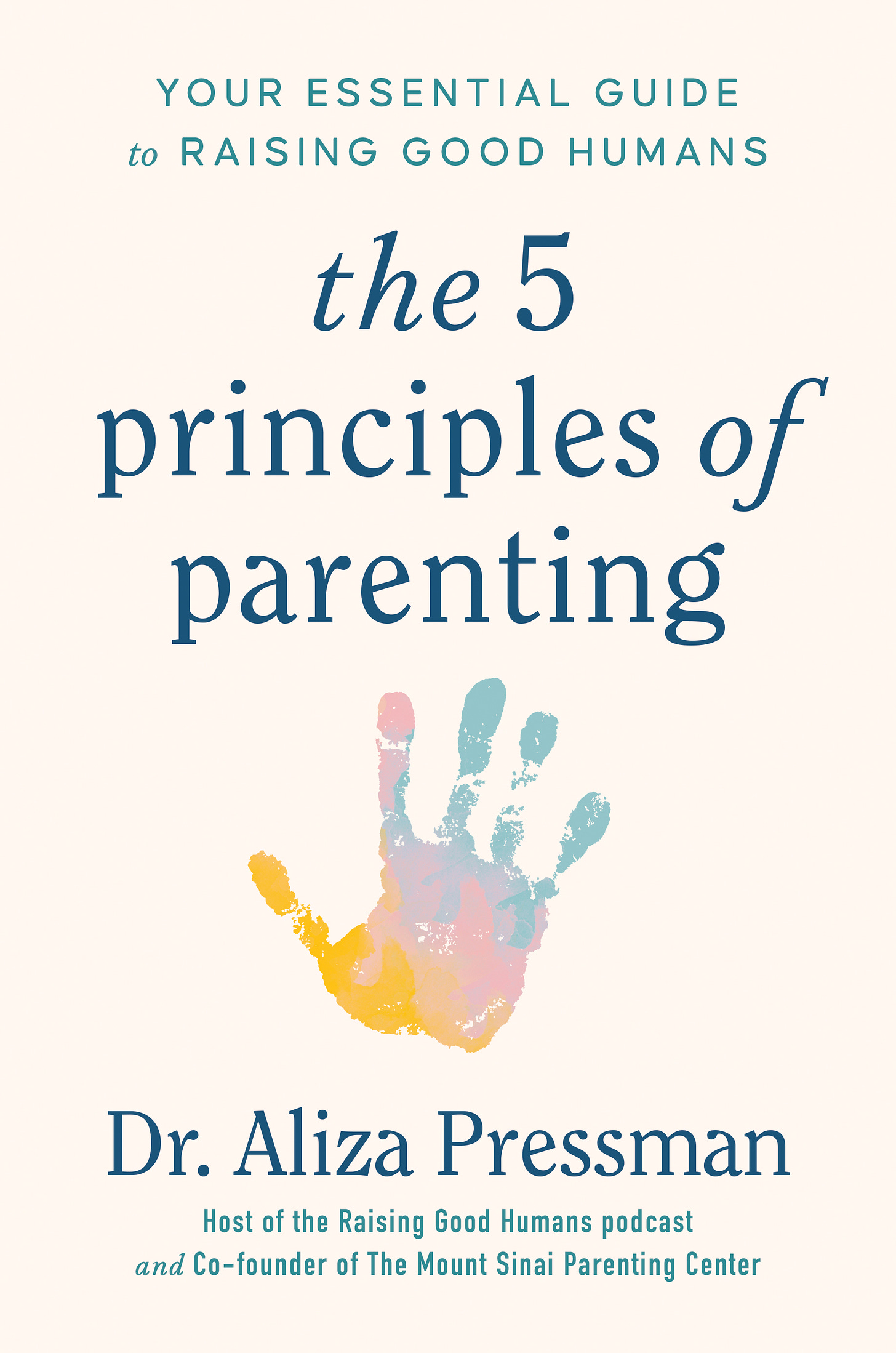Thanks for reading Raising Good Humans on Substack! My first book, The Five Principles of Parenting: Your Essential Guide to Raising Good Humans is now available for purchase here.

Crises, like the recent wildfires, can leave us feeling helpless. As parents and loving humans, we want to do right by the moment and support those affected (both adults and children). This week on the Raising Good Humans Podcast, I partnered with Kelly Corrigan, NYT bestselling author and host of the podcast Kelly Corrigan Wonders, to review some helpful advice on how to show up and be supportive during these challenging times. We hope this is useful for those on the sidelines, but please know that if you are reading this and are impacted by the fires right now, we stand beside you with hearts that are full of love and sorrow.
In any crisis, it’s important to recognize the urge to be helpful. For many of us, being helpful is important to our own mental health. Being helpful makes us feel active, it gives us hope, and it reminds us of the good in the world. No doubt, our love and efforts also support those who are hurting - as long as we make sure it is about what they need, and not what feels good to us. As Kelly is so good at reminding us, from her own experience, showing up is about staying tuned to the channel of the people we love, not our own.
“Being helpful helps us all feel like there is hope in the world.” Dr. Aliza Pressman
Tips for Supporters:
Acknowledge the experience. Avoid minimizing anyone’s experience or comparing it to other situations. Be wherever your loved one is in their own moment, and simply let them know you care and are there for them.
Check in regularly. A simple text or call can go a long way, but it doesn’t need to be returned. Say, “No need to respond” in order to lighten the burden of others, and don’t take it personally if your loved one doesn’t get back to you, or take you up on your offers.
Be patient and understanding. Remember that everyone responds to crises differently. Allow for a variety of responses, and don't judge anyone for how they're coping. This is a moment to practice perspective taking, the idea that everyone else’s point of view is not necessarily the same as your own. Take a beat to figure out what your loved one thinks, no matter how different their reaction may be from your own.
Ask, don’t tell. Kelly loves the mantra, “Fewer statements, more questions.” In order to really make someone feel loved and supported, we need to offer them a space that is safe, free of unwanted judgement and advice. This is not the time to prove how wise you are, but instead to listen to whatever your loved one truly feels and needs.
Offer, don’t insist. It can be so helpful to offer practical support, like bringing someone food, offering a place to stay, or helping with childcare. However, you want to make sure that your help is actually useful and not overwhelming the recipient. Try saying, “Would it be helpful if I…” before offering a suggestion.
Don't forget. The immediate aftermath of a crisis is often when people receive the most support. As time passes, and the immediate crisis fades, try to remember your loved ones and their ongoing journey.
“Everyone will respond to everything that happens in their own way. If you are coming in to serve, then you have to tune to their channel, not try to get them to tune to your channel.” Kelly Corrigan
General Tips for Kids:
Limit news exposure. Young children shouldn't be exposed to graphic news images or videos. These can be confusing, scary, and overwhelming. Older children and teens should be monitored and have their news consumption limited (along with yours).
Reassurance. Let your children know they are safe and loved. In times of crisis, we can be the steady force that helps to ground our children. And while we can’t promise that bad things don’t happen in the world, we can assure them of our love and our commitment to keep them safe.
Maintain routines. Keeping up with regular routines, like school and bedtime, can provide a sense of normalcy and security. Many kids, especially those most affected, need the healing power of something that feels predictable, safe, and consistent.
Allow for any reaction. Let your children express their feelings without judgment. No two children will feel or respond the same way to a crisis. Lean into the opportunity to teach tolerance and acceptance of other people's reactions, rather than trying to convince anyone of yours.
Activate. Turning empathy into action can help our children move from sorrow into hope. Discuss ways for them to help in your community, your family, or on a larger scale.
Finally, be mindful of your own needs. Taking care of yourself is essential so you can be there for others. Compassion fatigue is real. Make sure you fill your tank in all the ways that feel good, and that you know how and when to find balance. This will be a long road and support will be needed for quite some time.
A quick reminder to buy my first book, The Five Principles of Parenting, and write a review from wherever you order. Reviews really help to get the book noticed, and to spread the word. Please especially rate and review any books purchased on Amazon (it shockingly really, really matters!). Also, when you receive the book, snap a quick pic with it and post on social media. Share one thing you love about it and help me to get more copies into the hands of parents in your community. Tell a friend about the book, or about something you found helpful in the book. Parents look to each other for advice, and I’d love to be a part of the support you pass on to your loved ones.






This is such a thoughtful and important post, Aliza. As a pediatrician, I see firsthand how crucial these principles are, not just in times of crisis, but as a foundation for overall well-being. You've beautifully articulated the need for empathy, patience, and truly listening – skills that are essential for both supporting loved ones and fostering healthy parent-child relationships. I particularly appreciate your emphasis on maintaining routines for children. It's amazing how that sense of normalcy can provide a bedrock of security during uncertain times. And your point about activating empathy is key – empowering kids to take positive action can be incredibly healing. It aligns perfectly with the six pillars of health I constantly advocate for in my practice: mindfulness, movement, nutrition, sleep, connection, and environmental awareness. These pillars, when nurtured, create a strong mind-body connection that allows us to navigate life's challenges with resilience. Thank you for sharing these valuable insights! It is truly a difficult time for so many families.